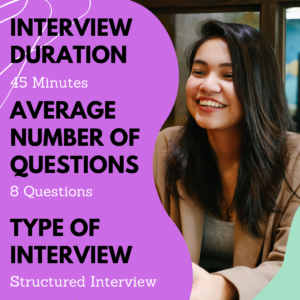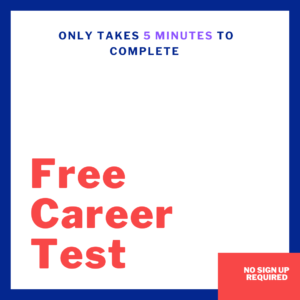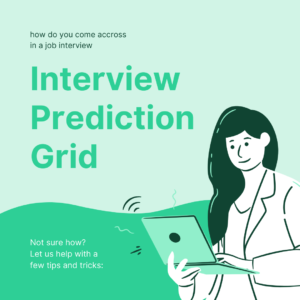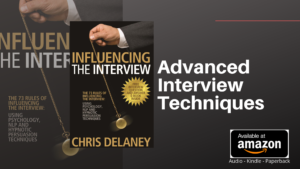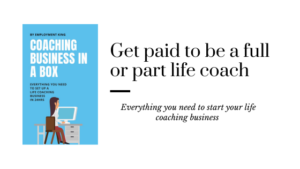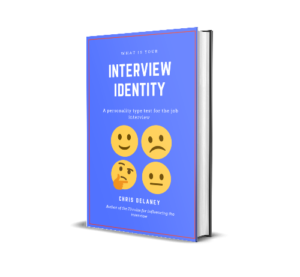Job interview preparation is key to a successful job interview outcome.
Each job applicant should first reflect on their past job interview performances and take the interview identity test to understand how they are viewed by an employer.
Once a career professional is aware of their interview identity, the next stage is to understand the commonly asked job interview questions.
With a list of interview questions, the job applicant is then ready to write, edit and practice their interview answers using the templates below.
Interviewees must add their own stories, real-life examples, facts, and figures, plus embed industry jargon.
To pass a job interview, a successful applicant only needs to score higher than the other (on average) 6-7 interviewees.
A large list of job interview questions and answers
Each interview question will come with an explanation of how to answer the question, to help each applicant highlight the value they can offer a new employer.
Remember hiring managers are looking for a potential employee to stand out – What can you offer that others can’t? What is your industry knowledge and expertise? What personal skills would add value?
Job Interview Question:
Tell me about yourself?
The most commonly asked question during the recruitment process.
You will be asked this interview question in some form.
Give a short statement about your education, experiences, and skills relevant to the job position you are applying for.
- Highlight your main strength and/or achievement and your duration in the sector and/or education
- Keep each selling point brief, as you can explain each point again in more detail throughout the interview
- End this answer with a reason why you’re looking for a new job
“In total, I have over X number of years experience working as a (job role). In (year) I gained a (qualification). Throughout my extensive work experience in (sector), I have (key selling point) and (second unique selling point). I have applied for this role because (company interest) and due to my passion for (job duty).”
Job Interview Question:
Why did you leave your last job?
Be positive when answering this tricky job interview question.
Stay away from any negativity or complaints about previous managers, working conditions, or colleagues.
Hiring managers like to hear that you left for a good opportunity or reason, rather than a tall tale.
- Start the answer with a postive reflection on the previous workpalce
- Explain what excited you about your last position
- End with a (positive) reason for leaving
“I enjoyed working at (company name) as I was able to (achievement). The (aspect of the company culture) was good as this allowed me to (positive action), which resulted in (positive result). The work was exciting, as I was able to (work undertaken) which allowed me to gain (skills). It was a difficult choice to make, but I am leaving the role because (positive opportunity).”
Job Interview Question:
What experience do you have in this field?
- State criteria on the job specification
- Frame the answer in the positive
- Relate previosu experiene to the duties of the new job role
“I have over X number of years working in this field. During my time working as a (job role) I have successfully been able to (big achievement). This is because of my ability to (skill/action). During my time in the sector, I have undertaken a number of roles/worked on projects including (name specific duties, projects, and achievements). What I can bring to your team, is the ability to (key actions and skills).”
Job Interview Question:
Do you consider yourself a successful person?
Never give a short ‘yes’ answer. And never, ever, answer with a ‘no’.
The job interview panel is looking for evidence of sector-related knowledge and experience that they can reference against the job interview scorecard.
This means that the job interview answer requires substance.
Talk about industry success, relating the answer to the job criteria.
“I am highly successful. Throughout my career I have been (involved/a leader of/part of a team) that was responsible for (overcoming a barrier/facing a job-related challenge). An example of this was when I was working at X, and I had to (actions) to help achieve an (outcome). The secret of my success is my ability to (unique selling point)”
Job Interview Question:
How would your colleagues describe you?
To make a lasting impression, use quotes rather than just stating that employees would be positive towards you.
Quotes sound more powerful, more believable.
“I’m lucky, throughout my career I have worked with some great people which helps to be successful within a task or when working on a project. My previous colleagues have always had respect for my dedication, work ethic, and (add third skill/quality). In my previous position, I was always known as (positive attribution). (Name of manager), my line manager, would often say (positive quote). In fact, this reputation has been with me throughout my career. When I was working at X, my manager there would also say (positive quote)”
Job Interview Question:
Are you applying for any other jobs?
It’s rare that a career professional only applies for one position.
In truth, once a job hunter starts searching for positions they are likely to apply for at least 10 roles.
The ‘number of other jobs’ interview question is asked to check if the applicant will have loyalty to the organization – if the applicant is only applying for this one role, they must really want to work for the organization.
So, the reality (employees applying for numerous positions) and the employers ideal (the applicant only applying for the one job role) is a mismatch.
“I have applied for a few positions. For each job I come across, I research the company to check if we could collaborate successfully together. I am always interested in (company culture/projects/reputation). I was really excited to receive the job interview offer for this position, because during my research I learned (amazing fact) about the company, which helped me realise that this is the type of company I would want to work for above all the other vacancies I successfully applied for”
Job Interview Question:
What salary are you looking for?
Prior to the job interview, in preparation for the ‘salary’ interview questions, career professionals must:
- Check the salary average for the advertised role
- Complete the interview identity test to understand how an employer perceives them during the recruitment process – as this affects the salary offer
- Check if the position is one that high salaries can be negotiated – as for many roles, the negotiation is within a salary band, not open.
“Due to my extensive experience within the sector, where I have the (skill/experience) to (unique selling point) which can result in (financially linked selling point) as well as having (second unique selling point) I am looking for a position with a salary of (add amount)”
Job Interview Question:
How long will you stay with our organisation?
Employers spend around 33% of their profits on recruitment.
The employment duration interview question is based on the requirement to employ staff members who won’t leave after a short period of time.
What an employer is looking for here is reassurance.
“I am looking for a position within an organization that I know I can add value to. I prefer not to jump from job to job, and only take offered roles where I can see myself staying for a long period of time. I really like the sound of the (company/job role) and if I was successful I would hope to be here for many more years to come.”
Job Interview Question:
If you could, would you retire right now?
Some job interview questions do, on the face of it, sound a little random.
Successful interviewees also reflect on a potential interview question to better understand the hidden reason for the said question to be asked.
Everyone wants to retire, don’t they?
The truth is not everyone does wants to retire. In fact, for some career professionals, their job is their life.
This is what is at the bottom of the ‘retirement’ interview question. What is really being asked is – are you passionate about your chosen line of work or is it just a pay ticket?
“No, I wouldn’t retire. I am very passionate about what I do and I am especially focused on (long-term achievement). For me, a job isn’t just a salary it’s about (state passion/reasons for working in the industry).”
Job Interview Question:
What are you looking for in a job?
The three rules for a successful job interview outcome are:
- Identify the job criteria
- Be a self-promoter
- Communicate with confidence
Answering the ‘what are you looking for in a job question?’ with salary, working near home, or any other ‘wants’ will only result in a lack of job offers.
Employers will score high interview answers that state a liking for the job criteria.
“The three key things I look for in a job are (generic criteria 1, 2 and 3). More specifically I excel in (describe company culture). Because I am skilled at X, I always work well when (state a duty/task you perform well).”
Job Interview Question:
What motivates you to be your best?
This interview question is looking at an applicant’s personal motivation.
The motivational traits must match the job criteria.
As an example, stating that you are motivated while working with others as part of a team would score high for a team role position but not when working in a job role that requires an employee to work on their own initiative.
A second way to answer the ‘motivation’ question is by focusing the answer on a vision – the same vision the company has.
“I am a highly motivated person who enjoys (sector-related outcome). I am at my best when I (job-related criteria 1, 2, and 3). What helps to keep me motivated is my personal goal to (a goal linked to the employer’s company vision).”
Job Interview Question:
Are you willing to work overtime?
The ‘overtime’ question is only asked in a recruitment process when the employer needs employees to have a flexible approach to their working hours.
If asked the overtime question, and offered the position, there will be an expectation for the applicant to work more than their standard hours.
“Yes, I am always happy to work additional hours. In my last position, we would often work overtime during busy periods such as Christmas or at the financial year-end. I understand the importance of not letting customers down, which sometimes means the team needs a flexible approach.”
Job Interview Question:
Are you happy working on a shift pattern?
Unlike the ‘overtime’ question, the shift pattern question isn’t asked as an unwritten rule that employees, once employed, will be expected to work on a shift rota.
There is a legal amount of hours an employer can force an employee to work, hence why the hiring manager checks flexibility.
If the employer only recruited shift workers, those hours would be made clear in the job advert.
The ‘shift-work question then is asked by hiring managers who recruit a large number of employees; some working shift patterns and others on a more traditional 9-5 schedule.
The question is often asked during a large recruitment drive and, in the main, doesn’t affect the hireability of the candidate.
Answers, then, should be honest.
If you are unwilling to work shift patterns let them know, and if you prefer a shift pattern (that often comes with a higher salary) then state this preference.
Even if the answer to the shift-pattern interview questions affects the likelihood of being recruited, honesty is still the best policy. If you dislike shifts and get recruited for a position that works on various shifts, it is unlikely that you would enjoy the role.
“I read that the role might include shift work and I am very happy to work on a shift-rota”
Job Interview Question:
Are you willing to relocate?
When an employer requires you to relocate, they would have stated this in the job specification so the questions shouldn’t come as any real surprise.
What is sometimes not clear is the location or locations where the job role may be.
“The idea of relocating is one of the elements that drew me to this role. I researched the (location) and I am really excited about the idea of living there. To help me decide whether or not to apply for the role I undertook some research to check things like house prices, crime levels, and general living conditions – did you know that (share positive fact about location)?”
Job Interview Question:
Are you willing to put the interest of the organisation ahead of yours?
Hard-hitting job interview questions are, in the main, only asked for high-paid and high-skilled job roles.
For this level of employment, hiring managers need a career professional who will go above and beyond, an employee who isn’t just applying because they need a salary.
High-level positions will require decisive action when problems occur. During a big crisis, for example, a company-level hack, the IT project manager would be expected to come back from leave to help solve the problem.
“Of course, at this level, it is important to hire someone who has the company interest at heart. When I work for an organization, I give it my all. As an example, while working at X a (problem) occurred. At the time I was (on holiday or other situational problem) but due to the urgency and risk of the (problem) I (actions taken). My actions and my commitment to the company interest resulted in a (positive outcome).”
Job Interview Question:
Describe yourself as a person?
This question is perfect for rule two of a successful job interview; be a self-promoter.
First, think about the job specification, the duties you will perform, and the culture of the organisation.
When selling yourself, talk only about the skills and qualities you have that are relevant for the advertised position.
“I am a (quality) (quality) and (quality) individual who specialises in (skill). When working on (sector-related task) I am able to (achievement) due to my (skill/quality). Colleagues and stakeholders describe as (quality) due to my ability to (achievement). My key strength is my ability to (skill/achievement) which I achieve due to (skill/quality).”
Job Interview Question:
What is your philosophy for working?
A career or working philosophy is similar to an organisations mission.
A one-line that accomplishes who you are and what you want to achieve in your career.
Think of the philosophy, as a career identity.
Don’t be tempted to give a deep long answer here, keep it short, sweet, and positive;
“I would say my work philosophy is (add selling line, as an example – completing tasks on time and to a high standard”
Job Interview Question:
Would you say that you are overqualified for this position?
Why are hiring managers concerned about an applicant’s level of qualification?
The truth is, one of the elements of the hiring decision is the likelihood of the duration of the candidate’s time employed within the organisation.
A high-level qualification in a specific field is generalized as the applicant, ideally, wanting a job in the sector related to their degree.
This means, from the employer’s perspective, if the highly qualified applicant is offered the advertised role, they are likely to hand in their notice within the year, leaving the employer to re-recruit.
The interview answer, therefore, must reassure the interview panel that the applicant is passionate about role/job sector/company.
“No, not at all. My qualification is in a completely different field. This was a sector I was previously interested in when I was a lot younger. My goal is to work as a (job role) which is why I applied for this position. My qualification did teach me (knowledge) which can be used when doing (job duty for new role). I am also thinking of undertaking a qualification in (qualification relating to new role).”
Job Interview Question:
How would you describe your work ethic?
Work ethic is becoming a key recruitment factor.
In fact, more employers are using strength-based job interview questions as part of the structured job interview.
Work ethic basically means – how hard-working are you?
The ‘work-ethic’ interview question is another opportunity for an applicant to sell themselves.
Answers with examples do well for this job interview question.
“I have always been a hard worker. When I am working on a task I put my all into it, as I enjoy seeing the end result from my hard work. As well as meeting deadlines and targets, the quality of my work is also important to me. I always ensure that tasks are completed to the best of my ability and I never take shortcuts that would risk the quality of my work. An example of my work ethic is (give example).
Job Interview Question:
What do you enjoy doing outside of work?
An applicant’s character can be an indication of their work ethic.
The ‘what do you enjoy doing outside of work?’ question is a sneaky way of asking about a person’s characteristics.
Common mistakes when replying to this interview question, include saying:
- Socialising with friends
- Nothing really
- Watching TV
- Bars and clubs
- On the web
When answering the question, focus on areas of your life that highlight skills, qualities, and work ethic. This could include:
- Volunteering
- Having a side hustle business
- Self-published author
- Fundraising
- Being a carer
What is important is to detail the skills, knowledge, or experience gained from the task that can be of use to the new employer.
“I currently do X. What I like about this role, is that I have gained (skills/qualities) which would be of use when performing (task). For the last X number of years, I have also been involved in X which has taught me the value of (skill/quality). While doing X I was praised for (skill) and was lucky enough to gain a (qualification in X).”
Job Interview Question:
Why did you apply for this position?
The interview answer to the ‘why this role?’ question can be split into two sections.
First, talk about your passion for the job sector/job role and how this is part of your long-term career objective.
Second, explain why you want to work for their organisation. Make this personal – you don’t just want any job, you want a job with (employer).
“My career goal has always been to work in (sector). For the past X years, I have been working as a (job role) gaining (skills and experiences). During this time I have gained (sector-related qualifications) that have given me the knowledge to (job duty). As a highly skilled and experienced (job role) I am able to (future achievement). I applied for this particular role because I have always wanted to work for an organisation that (describe company culture, projects the company works on, or the company’s mission and vision).”
Job Interview Question:
Where do you see yourself in 5 years time?
Employer requirements, for a new member of staff, vary depending on the size of the organisation, the industry the employer is involved in, and the type of job being advertised.
Some employers will look for an employee who will grow and be promoted within the company, while others need a skilled applicant who will work long-term in the one role. One employer may require an innovative individual, while a second needs someone who will follow strict processes and procedures.
The answer to the ‘5 years time’ question will vary depending on the above criteria. This is why rule 1 of a successful job interview is, identify the job criteria. As knowing what is important to the employer will assist in the decision of what to reference during the interview.
In all cases, the employer is wanting to hear that the candidate is wanting to stay within their organsiation.
“Before applying for the position I researched your company and found that (state three things you like about the organisation). It was the company’s (reference something from the company’s values/mission) that inspired me to apply because I am also motivated by (reference the value/mission). As I am passionate about (job role) and I feel this company is the perfect fit for myself, I can see myself working here, successfully collaborating with yourself to achieve (outcome).”

Skill related job interview questions
Employers will ask a number of ‘skill’ related job interview questions to understand how competent the potential employee will be once employed.
Job Interview Question:
Are you a good team member?
Team member interview questions are asked in a high number of job interviews.
Even for roles where, in the main, the employee works alone. In this situation, the employer is looking for a ‘big picture’ understanding – how the various departments are part of a larger team.
Most commonly, the teamwork question is asked to applicants who are applying for a team role.
“In all my previous roles I have worked as part of a team. I enjoy teamwork as collectively the team has a wider range of skills and experiences that they can bring to a project. Within a team, I often take the role of a (add role) as I am able to (actions) that help the team to achieve an objective. When need I can (2nd team role). As an example when working in a team to achieve (outcome) we faced (problem) and I (state actions took) which resulted in (outcome).”
Job Interview Question:
Why should we hire you?
For every advertised role, around 6-8 applicants are interviewed.
Each applicant has the skills and/or experience for the advertised role. The ‘why should we hire you?’ interview question, is really asking ‘why should we hire you and not one of the other interviewees?’
To pass a job interview, an applicant only needs to score higher – be seen as more employable, than the other 6-7 interviewees.
To answer this interview question, highlight your unique selling points.
“By hiring me you will gain an employee who has extensive success of (achievement). In addition, I have a proven track record of (A and B). As an employee, I am (add a list of qualities). But the main reason why you should hire me is because of my ability to (unique selling point).”
Job Interview Question:
Why did you leave your last job?
Many hiring managers believe that past behaviors predict future actions.
It is such a popular belief that ‘behavioral job interviews‘ are based on this premise.
Employers request the reason for leaving a past employer, to compare the answer to their own company culture.
In addition, many hiring managers will review the number of positions an applicant has held over a small number of years.
The frame of the interview answer must be positive. Avoid, at all cost, any criticism of past employers.
“I enjoyed my time at X company. While working there as a (job role) I was involved in (projects) which gave me experience in (duties). Throughout my time there, I have gained a variety of skills, including A, B, and C. I am now in the position to use this collective experience in another role, which is why I am here today applying for the position of (job role).”
Job Interview Question:
In what way would you be an asset to us?
The ‘asset’ question allows an applicant to discuss any unique selling points not already covered throughout the recruitment process.
For the ‘asset’ question give a look forward – draw a picture of you succeeding in the workplace.
“As someone who is skilled at X, I know that we would work well together. As an example. If you imagine me working for you in 3 months’ time on a (project). I would first (state actions) as this would (state benefit). Then to gain a (positive outcome) I would use my (skill/knowledge/contacts) to gain (outcome). Finally, when ending a (project) I would (action) to help any future tasks.”
Job Interview Question:
Tell me about a suggestion you have made?
Many of the interview questions asked during the recruitment process, give an insight into the culture of the company.
As an example, some industries are process-driven whereas others are more creative.
The ‘suggestion’ questions indicate that the employer is looking for solution-focused and innovative employees who can see the ‘big picture’.
“There have been a couple of times that I have made I suggestions to (overcome a problem) that have been taken up by the company. An example of this is when I was a (job role) at (organisation). One of the problems we faced was (problem) At first the company tried to (action) but this only resulted in (very little change). Due to my (knowledge/experience), I knew that (potential solution) would work, I suggested this and created a plan of action/project plan which resulted in (positive outcome).”

Job Interview Question:
Do your co-workers ever irritate you?
The frame of the interview question can easily influence the job applicant to answer with a negative answer.
Instead, re-frame the interview answer by focusing on how you work well with colleagues.
“I am a people person, so generally I get on well with everyone. As a professional with X number of years experience in (industry), I have worked with a variety of colleagues and stakeholders. The experience has helped me to understand the various personalities people have, and how their temperament makes people react in a different way to the same challenge. This knowledge of people’s personalities helps me to build rapport with others.”
Job Interview Question:
What makes a successful manager?
This is a management role question, but the question is asked across all job roles – with the hiring manager replacing the job title at the end of the question.
Answer the question by discussing the skills the (position) requires and the criteria on the job specification.
End with an example of you being successful.
“There 3 key skills that make a good (job role). this first is A, the second B, and the third C. A (job role) task is to (main objective). By doing (A, B, and C) a (job role) will be successful. An example of me being successful is when I was working at (company name) and I had (task). To ensure a good result I (took action) which had a (positive outcome).”
Job Interview Question:
What are your strengths?
The ‘strength’ question is one of the most commonly asked job interview questions.
The openness of this interview questions gives the candidate the opportunity to talk about their unique selling point.
When creating an interview answer, the interviewee should think about the job criteria, the main skills and strengths required for the job role, and any additional information that makes them stand out from the crowd.
“I have been told by my previous manager that I am highly skilled at (task). But when I reflect on my key strengths, two come to mind. My first strength is my ability to (task). When working on (task) my (skill) and (quality) ensure (a positive result). My second strength is related to (job duty). I have always been skilled at (skill) which helps when I (task).”
Job Interview Question:
Do you have any weaknesses?
Many interviewees fail to understand the real reason why a hiring manager asks the ‘weakness’ interview question.
In the main, a job applicant will fall into the trap of listing several weaknesses or areas of development.
A focus on negatives will only result in a low-scoring answer, or at worse the employer believing the applicant is unsuitable for the advertised position.
What the ‘weakness’ interview question is really asking is, ‘how do you develop yourself?’
“Everyone has areas of development. What is important, is to be able to reflect on the actions taken for previous projects and then review weaknesses and learning needs. As an example, when working at (company name) my team’s task was to (add detail). After completing this task I realised that I need to improve (knowledge/skill) so I undertook (training/research/mentoring)to develop this (skill/knowledge). Whenever I recognize a professional development need, I always take action to resolve this, as I am keen to become the best (job role) I can be.”
Job Interview Question:
What is your dream job?
A common reply to the ‘dream job’ interview question is: ‘This job!’.
Employers hate this type of interview answer as it comes across as trying to please. And, it is something a dishonest interview identity is likely to say
What a hiring manager is really trying to uncover, with this interview question, is the specific reasons for applying for a job in the employer’s industry.
“What is important for me in a career is the chance to (achieve vision). I really enjoy roles where I can (job criteria) and (job criteria). In all my previous roles I have been drawn to positions that (job criteria), as this meets with my (skillset/values/mission). “
Job Interview Question:
What would a past employer say about you?
Hiring managers use the ‘past employer’ question to catch an applicant out, depending on their previous working relationships.
For a future employee who only has praise from previous managers, this great becomes an excellent ‘selling’ answer.
“They would want me to come back! All my previous employers hold me in high esteem. This is because of my ability to (complete tasks), as well as my (personal skill) and (work attitude). I remember in my exit interview with my last employer, they said (add positive quote).”
Job Interview Question:
If you were the interviewer, what type of person would you look for?
Describe yourself, without making it too obvious.
When talking about personal skills and experiences, make these relevant to the job criteria.
“As the main objective of this role is to X, the ideal applicant would need to have experience in X and be highly knowledgeable on (subject). As well I possessing this industry knowhow, I would look to hire someone with (personal skills and qualities) to ensure the team collaborated successfully together.”

Knowledge and Competencies Interview Questions
Industry knowledge and experience are one of two axes that create each of the sixteen interview identities.
To be seen as being employable, each candidate must highlight a high level of knowledge around the job role.
A hiring manager only knows about the candidate, what they have been told by the candidate.
Job Interview Question:
What do you know about this organisation?
Research is key prior to preparing for the job interview, especially when asked the ‘about us’ interview question.
Research the company and become knowledgeable about the following criteria:
- The duration the organisation has been in business
- Why the company was formed
- Thier vison and mission
- What services/products the company offers
- Future projects or collaberations
“The reason I applied for this role in the first place was due to your (vision) and this is in line with what I want to achieve as part of my career. What I also like about the company is that it was formed because of (reason) and is now successfully in its (year) of operation. You have a reputation for being (positive trait) and for (second positive trait).”
Job Interview Question:
Why do you want to work here?
Stand out from the crowd, by using the research gained from the ‘about us’ question to state an answer to show a real understanding of the company.
“As a career professional, I’m not just applying for any job. I am only attending interviews for a position in an organisation that I can see myself succeeding in. I choose (company name) because I follow your company and I know, from my research, that long-term you want to (long term business objective). The barrier you will face will be (state problems to objective). My skills and experience in (job sector/role) will help you to achieve your objective by (state knowledge and experience you can bring to the team).”
Job Interview Question:
What have you done to improve yourself over the last 12 months?
Globalisation, technology, customer demand, and artificial intelligence, and big-data are rapidly changing the career market and business operational strategies.
Employers, therefore, require employees who are willing and proactive in their continuous professional development.
“I am constantly reflecting on my work, skills, and knowledge and looking at ways to develop myself, both professionally and personally. Over the last 12 months, I have undertaken several development opportunities. The first was (work-related CPD) this taught me the importance of (learning). The second was to help me with (personal skill) as I know this skill is highly important when (job duty) and the third was (knowledge related CPD) which has allowed me to understand why (potential barrier).”
Job Interview Question:
Do you know anyone who works here?
Association plays a big part in this answer. At a basic level, the min takes short-cuts and jumps to conclusions.
The employers ask this interview question because by knowing another employee you will have a better understanding of the job role and company culture, meaning that you are happy with the working conditions.
But by referencing you know an employee, who has a strong work-ethic reputation, the positive association from the employee you know is transferred to you the applicant.
“I know (name) who works in (department). He worked on (project/team) for the last (number of years)He explained the company culture, the vision of the organisation and how you (selling point). He made me excited about wanting to apply for a job here.”
Job Interview Question:
Have you ever had to fire anyone?
This management interview question is just one of several job interview questions that is asking for a specific experience. In all job roles, across all job sectors, job applicants will be asked for examples of how they can complete or have completed various job duties.
Examples are best used here. Or an explanation of the steps you would take to complete the task.
“While working at (company) one of my team was constantly not meeting her targets. To support staff member I (actions taken) and work closely with the staff member to (improve). Over several months I supported the staff member and did notice a slight improvement but nowhere near the average number of (sales/referrals/etc). At this stage, it was the company procedure to implement their warning process which included a creation of an action plan, regular meetings, and (any other requirement).
In the end, we felt we had done all we could to support the member of staff and in the end had to let her go. The member of staff actually agreed this was the best choice and thank us for all the support over the last several months”
Job Interview Question:
Have you ever been asked to leave a position?
As employers can request references, it is important to be truthful here.
This type of interview question is asked during an informal job interview and can come out of the blue. So be ready.
If you have never been asked to leave a previous position, simply say: “No, never”
If you have been in a situation where you were asked to leave the organsiation, answer with:
“X number of years ago, I was asked if I would like to leave the job role. It was a (make the job seem less important: part-time job, my first job after leaving school, a secondary job). The position didn’t suit as I am a (add skills relevant to the new position) and the company focused on (add a re-frame IE quantity over quality).”
Job Interview Question:
What kind of person would you refuse to work with?
Interview questions that talk about other staff members are designed to uncover if the applicant would fit in well with the current team and the culture of the company.
“As a people person, I always get on well with everyone I meet. Throughout my career, I have worked successfully with people who have different experiences, knowledge, and personalities. So I am happy to work with most people. Obviously, I prefer not to work with someone who is lazy or demotivated, But sometimes my personality actually motivates colleagues to work harder.”
Job Interview Question:
Have you ever had a problem with a supervisor?
This question must be answered positively to have any chance of being offered the job role.
“No never. Communication is key for a good working relationship with a supervisor or manager. If there is any negativity in the workplace I can quickly resolve this by having a conversation and looking at what we can do together to overcome any problems.”
Job Interview Question:
How do you approach a project?
Project approach questions are asked in job interviews for all types of positions, not just project management roles.
When answering the question, state a step-by-step process that the applicant utilises.
“The first step is to review the (project brief/task objective). I will often then look at lessons learned from previous (projects/tasks). The project is then broken down into manageable steps, with each step having a deadline date. I look at the risk of each step and if needed create a risk plan. Finally, I delegate and distribute workloads, and set up regular reviews.”
Job Interview Question:
What has disappointed you in a previous job?
Some interview questions sound like a trap. Each interview answer must be framed as a positive to help create a high-scoring answer.
“I have enjoyed all my previous roles. In some positions, the job was challenging but I enjoy the pressure of a challenge. An example of this is when (challenge) and I was able to (actions) that ended with a (positive outcome).”
Job Interview Question:
Can you work under pressure?
Pressure for one person is viewed as a negative, while for others they thrive under pressure. The answer, therefore, needs to state how you handle pressurised situations.
“All jobs have pressure points. Preparing for pressurised situations comes down to how you manage workload. To manage my workload I (explain how you prioritise tasks). I also work with others to (collaborate/delegate to) and I use (technology) to help manage day-to-day tasks. This organised approach takes the pressure off. “
Job Interview Question:
How do you know when you have been successful with a task?
There are many ways to monitor success, depending on the industry the job is in. Employers are looking for applicants to understand when they are working well within the role:
- The job has been completed on time
- The task has been completed to a good standard
- When your customers walk away happy
- When you employer tells you
- When you have job satisfaction
“There are two ways I monitor my success, one is through (a data related example) and the second is (through a personal satisfaction or customer feedback).”
Job Interview Question:
Give an example of learning from a mistake?
Behavioral job interview questions require an example.
Focused the answer on what was learned, rather than the mistake itself.
“When I was part of a team working on (project name) the group didn’t have (knowledge/experience) to complete (task). As I knew this was an area of development for myself, I decide to action and undertake (training/qualification/research). A year later, the same team working on another (project/task) came across a similar problem, but this time due to my ability to learn from past mistakes, I was able to (give advice/take charge/share knowledge).”
Job Interview Question:
Do you have any blind spots?
The blind-spot interview question is another way to ask about weaknesses.
With the weakness question, which is asked more in a structured job interview, the ideal answer will focus on ‘lessons learned’. For the informal question ‘do you have any blindspots’ the answer can be shorter and more to the point:
“Not that I know off, if I ever discover a weakness I quickly take action to improve this area of development.”
Job Interview Question:
Do you have enough experience for this position?
This follow-up interview question is most commonly asked when an applicant hasn’t been given detailed enough answers that show a high level of competencies.
Employers, who may have been initially impressed by the interviewee’s application form, is having doubts. The interviewee is likely to be viewed with a weak interview identity.
This means the career professional must reinforce their suitability.
“Yes, I do. You are looking for an employee who can (main job criteria) and I have been working as a (job role) for (number of years) completing (main job criteria). In fact, I excel at (main job criteria). Let me share with you an example of this: When I was working at (company) my main task was (main job criteria) where I had to (state duties). In addition, I am skilled at (second job criteria). After (x number of years) in the sector, I have spent (X number of years) completing (second job criteria). There isn’t a (problem/task) in this role that I don’t have experience in.”
Job Interview Question:
What qualities do you look for in a manager?
Use a generic positive answer for ambiguous job interview questions.
“A boss who is knowledgeable, fair, loyal”
The skills needed in a specific sector are recorded on the job specification if the hiring manager requires someone who is creative (or any other job criteria) say:
“A manager who will allow me to be creative (criteria) ..”
Job Interview Question:
What is your role when working in a team?
Talking about a specific role within a team, offers the job applicant a chance to showcase a variety of skills relevant for teh advertised position.
“My natural role within a team is (state role). This is due to my natural ability to (task) and (task). I have a (personal quality) that allows me to easily (task). In addition, as a team member, I am skilled at (supporting role) which is due to may (quality) and (quality).”
Job Interview Question:
What would you say is your biggest achievement?
Only discuss work-based achievements that are relevant to the job role. Ideally, talk about overcoming a well-known industry challenge.
“As you know one of the biggest barriers we face in our industry is (sector-related problem). When working at a previous company, they also struggled with this particular problem. I was given the task of finding the solution. To find the solution I first (generated ideas), tested my theory, and then created a plan of action. The result was (positive outcome).”
Job Interview Question:
Why did you choose this career?
This interview question is a great opportunity to highlight your passion for your job sector.
“I have always wanted a job in (sector) as I am highly passionate about (industry). This started when I was young, I had (explain how you came to know about the sector) and really like the idea of (completing task). The job role really suits my temperament, as a (quality) person, I enjoy (job task). So, this job is perfect for me.”
Job Interview Question:
Tell me about the most fun you have had at work?
Give a specific example of enjoying overcoming a problem or finishing a large project/task – think job satisfaction.
“When working at X, we were working on (task or project. This was a difficult task due to (problem/barrier). We all had to work together, sharing ideas, trying new ways of working, and learning from mistakes. But the hard work and dedication paid off, as, in the end, we were bale to (outcome) which gave me a high level of satisfaction. It was the process of overcoming a big barrier that made this task fun.”

Job Interview Question:
Can you tell me about the gaps in your application/CV?
There are many reasons for gaps in your employment history, which include:
- Gap year
- Working on short-term contracts
- Redundancies
- Being a parent
- Being a carer
- Working in various roles
Think about the generalization an employer may have from the ‘gap’ and reframe this into a positive.
“In (year) I worked at X as a (job role) and then in (year) I started at X company. In between these two job roles I was (reason). This opportunity helped me to gain (skill/experience) that I now use when (completing job duty).”
Job Interview Question:
Do you have any questions?
Most interviewers ask this question and generally towards the end of the interview. Remember to prepare for this, as asking questions will be a great end to an excellent interview.
Don’t ask about salaries or holidays etc until you have been offered a job position.
- “Do you have any future plans to expand the company?”
- “Does your team work well together?”
- “What do you like about working here?”
- “Do you have an example of how the company embeds its values in to day-to-day duties?”
- “Have you put in any new bids for any new contracts?”
- “What is the company’s policy on personal development and training?”
- “Where do you see the company being in 5 years time”
- “What are you looking for in an employee?”
- “What would my first day/week look like?”
- “Why did you choose this job/company?”
- “What or who is the company’s biggest competitor?”
- “How is advancements in technology going to affect the organisation?”
If you are struggling with questions you can end with “I did have several questions planned to ask you, but you have answered these throughout the interview.”











